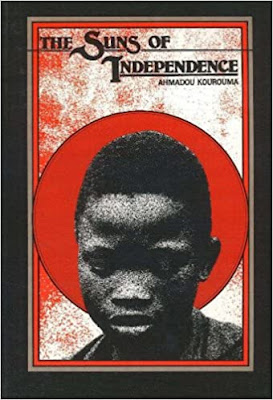Suns of Independence
Ahmadou Kourouma was an Ivorian novelist who wrote in French, so this first novel was published in 1968 but not translated into English until 1981. Kourouma has gotten lots of awards -- this novel won the Grand prix littéraire d'Afrique noire -- but hasn't attracted much attention in English. He was the son of a highly-regarded Malinke family, and that Malinke heritage (descendants of the Mali Empire, also known as Mandinka) forms a large element of his writing. Kourouma's main focus, however, was disappointment in the newly independent West African governments, which he saw betraying African ideals and descending into corruption. He was therefore imprisoned a time or two, but consistently stood against nationalism, wars, and corruption.
'Suns of Independence' is a literal translation of the Malinke phrase that we would say as 'days of independence.' Fama, the last descendant of the princely Dumbuya family, is an oldish man and down on his luck. He's given to speechifying -- or just ranting -- and is always concerned about keeping up the dignity of the Dumbuya. His wife, Salimata, is a hard-working woman who earns most of the money and desperately wants a child; she has tried every spell and ritual, but still no baby.
When Fama's cousin dies, Fama's role is to go back to his home village of Togobala and become the acknowledged, if unofficial, ruler of the area. So he travels home and is finally satisfied to be in his proper place, with two advisors (one Muslim, one traditional) and a retinue. Local officials are unimpressed but what does that matter? However, Fama almost immediately gets the idea that he must go back to the city to wrap up his affairs, get his wife, and tell everyone that he'll be staying in Togobala from now on. The omens are bad but he insists, and the results aren't so good, as Fama falls into the careless machinery of the modern state, which has no interest in his guilt or innocence, much less his status or personhood.
I was impressed with Kourouma's underlying critique of the independent government, while he also paints Fama as a man with an over-inflated sense of his own importance. The old days of the Mali Empire may have been better, but they're gone.
I find Salimata more interesting than Fama, and the part of the novel that focuses on her was the part I liked best. But she kind of fades out of the story when Fama goes home, and she never really regains her place.
Kourouma should be better known in the English-speaking sphere, and for those interested in post-colonial West African literature, this is a must-read.





Comments
Post a Comment
I'd love to know what you think, so please comment!